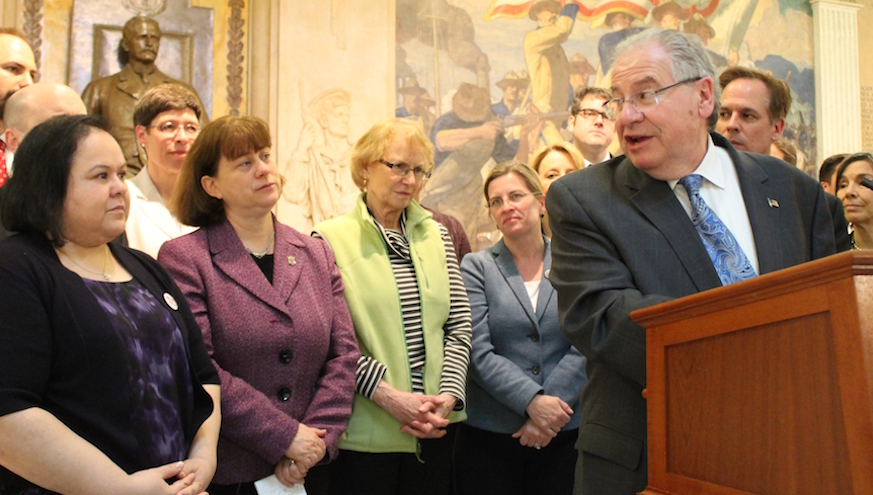Legislation mandating accommodations for pregnant women on the job appears likely to become law this session, barring unforeseen complications, after the Massachusetts House unanimously passed a bill that already has the support of a majority of the Senate and the governor.
The so-called Pregnant Workers Fairness Act (H 3680) filed by Sen. Joan Lovely and Rep. David Rogers offers pregnant women reasonable accommodations, including “more frequent or longer paid or unpaid breaks, time off to recover from childbirth with or without pay, acquisition or modification of equipment, seating, temporary transfer to a less strenuous or hazardous position, job restructuring, light duty, break time and private non-bathroom space for expressing breast milk, assistance with manual labor, or modified work schedules” as long as the accommodation “would not impose undue hardship on the employer.”
“As we all know, Massachusetts is a tremendous place to work and to raise a family. Unfortunately, there are some employers in our commonwealth who force pregnant workers into unsatisfactory working conditions ranging from the inconvenient to the downright dangerous,” Rep. Paul Brodeur, chairman of the Committee on Labor and Workforce Development, said on the House floor.
“Very often employees lack legal recourse to address improper working conditions or to reject accommodations that employers sometimes ask them to take that are token or insufficient, and very often they end up with their employment terminated,” Brodeur said.
The bill heads next to the Senate where its chances of passage appear bright. A majority of the Senate has already signed on to co-sponsor the bill and Gov. Charlie Baker said Wednesday he would sign it into law.
“The bill that I’m familiar with is the one that they just passed. If that bill gets to my desk, I would sign it,” the governor told reporters Wednesday after the vote.
A similar bill won a favorable report from the committee last session. Though business groups had opposed that bill last session, the Associated Industries of Massachusetts announced in March that it reached an agreement with the advocacy group MotherWoman on consensus legislation, which the House passed Wednesday. DeLeo identified the bill as a priority earlier this year.
“By bringing diverse stakeholders to the table we drafted a consensus-based bill that can be implemented smoothly and stand the test of time,” DeLeo said in a statement. “I want to sincerely thank the advocates who courageously shared their stories, they are heroes who have made Massachusetts a more just and safe place.”
According to MotherWoman, 18 states and the District of Columbia have taken legislative action to make sure employers provide accommodations for pregnant workers.
“It is critical that we protect pregnant women and new mothers in the workplace. We know that 75 percent of women will be pregnant at some point in their working lives and too often they are forced out of their jobs – or forced to take absences from work – at a time when they need the income and job stability the most,” Attorney General Maura Healey said in a statement. “This legislation will help ensure that employers provide reasonable accommodations to address the needs of pregnant women and nursing mothers.”
At the labor committee’s hearing on the bill in April, a woman who worked at a Worcester laundry facility told lawmakers that after asking her employer for lighter duty because she was pregnant, she was instead assigned more shifts and tasked with training more new workers than normal.
“She knew I was pregnant, and my supervisor rejected my requests. She said I could accept the work as it was or stop working there. She said that the change I had asked for would have been inconvenient for the scheduling program,” said Alejandra Duarte. “At that point, I did not know that my baby’s life was in danger. However, I thought it was unjust I was doing such a heavy amount of work when pregnant and she was not helping me to figure out how to make my job safer.”
After working a series of 10-hour shifts, Duarte felt a “horrible pain” and later learned from a doctor that her baby would not survive, she told lawmakers.
The Alliance for Business Leadership framed the issue as an economic one, particularly as the female share of the workforce grows.
“Today’s House vote supporting pregnant workers is good for business. We know that companies offering reasonable accommodations to their workers retain talent and save money,” ABL President Jesse Mermell said in a statement. “With half of pregnant women and new mothers in Massachusetts working – contributing to our economy and supporting their families – there’s no doubt that accommodating pregnant employees is the smart business move.”
Sen. Eric Lesser lauded the House’s passage of the bill Wednesday, and pledged to work with Lovely and the rest of the Senate to get the bill on Baker’s desk.
“The last thing we should do is penalize women who are trying to both raise a healthy family and get to work to support that family,” Lesser said in a statement. “Pregnant workers should be able to request reasonable accommodations, such as a stool to sit on or time off for a medical appointment, without fear of losing their jobs.”



















